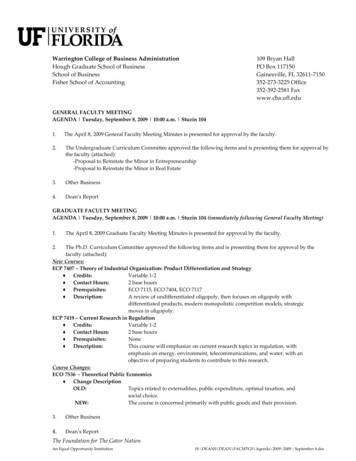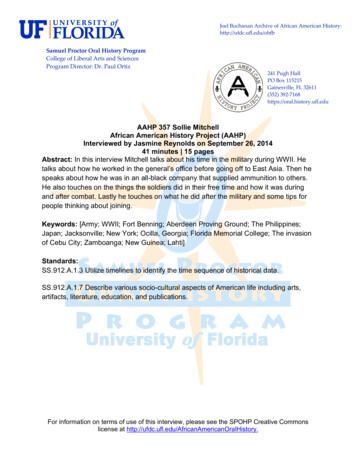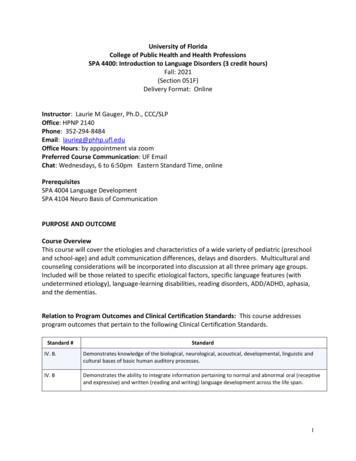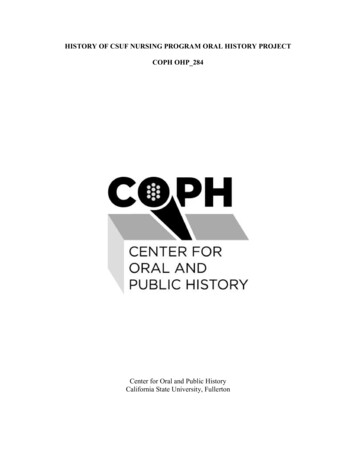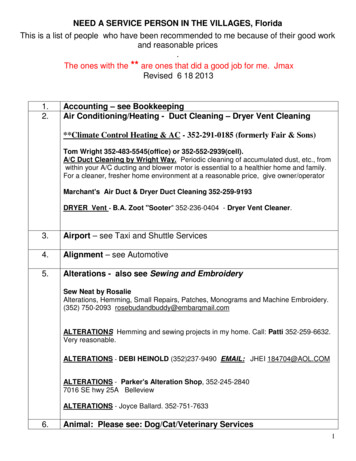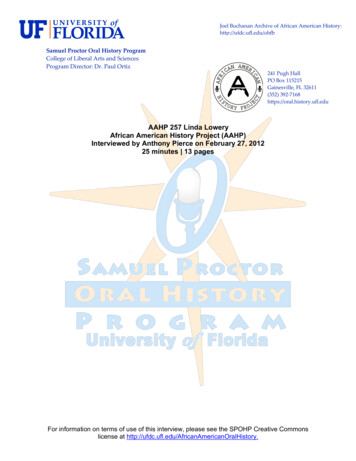
Transcription
Joel Buchanan Archive of African American History:http://ufdc.ufl.edu/ohfbSamuel Proctor Oral History ProgramCollege of Liberal Arts and SciencesProgram Director: Dr. Paul Ortiz241 Pugh HallPO Box 115215Gainesville, FL 32611(352) 392-7168https://oral.history.ufl.eduAAHP 257 Linda LoweryAfrican American History Project (AAHP)Interviewed by Anthony Pierce on February 27, 201225 minutes 13 pagesFor information on terms of use of this interview, please see the SPOHP Creative Commonslicense at http://ufdc.ufl.edu/AfricanAmericanOralHistory.
AAHP 257Interviewee: Linda LoweryInterviewer: Anthony J. PierceDate: February 27, 2012P:Today’s date is February 27th. We are at the office of Ms. Linda Lowery. Pleasestate your first and last name.L:Linda S. Lowery.P:And are you comfortable sharing your age?L:Yeah.P:How old are you?L:Fifty-eight.P:Fifty-eight, and were you born in Polk County?L:Yes.P:Now given that you were born to a migrant family, how was your life different inthe North in comparison to the South, in terms of race relations and routine?L:Well, not that much difference. A lot of people say that—well they used to say—itwas better in the North, and that Blacks were treated better in the North, but Ididn’t experience that. I experienced just as much prejudice in the North and theschools up there than I did down here. And a matter-of-fact it was better herebecause during that time schools were segregated down here. I didn’t have todeal with that. Up North schools were integrated, so I was just going to schoolwith White kids even before the schools down here desegregated. When they didsegregate I’m trying to say desegregate, when they did desegregate theschools I’d already been used to going to school with White kids. So when Icame home here, going up and down the Eastern coast, I was a migrant as youknow, and it was different because when I came back I was in all-Black schools,
AAHP 257; Lowery; Page 2and I had to deal with that. I didn’t have to deal with the racial stuff. When I wasin northern school they really discriminated against me. The teachers werehorrible. I remember sitting in one class, and the teacher just came out andsaid—it was a history class as I could remember—and he was associating theshape of my head with saying what part of Africa that I came from in front of allthe other students that was in the class, which they were all White. They werePolands, Germans, and a few Jews, but the Jews were very quiet because theydidn’t want them to know that they were Jewish, cause they did them the sameway. And they were horrible, and the children were very mean. When I went outfor recess I couldn’t play with any of the games or anything, they wouldn’t let meplay in any of their games, and when it came down to my turn they would not letme play. They would not let me jump rope; whatever they was doing, theywouldn’t let me play. So, that’s what I experienced in the northern schools.P:Can you explain to me how the cafeteria came to be built at your segregatedelementary and middle school in Prosproof?L:Oh boy. They had, we used to carry a pack lunch on the beginning, and they puta little building out there where the cooks just cooked, and they had a littlewindow where you come by and pick your plate up and take it to your room andeat. And my father was very involved in, what they called back then, PTA, and onhis days off he would come out to the school and he would do volunteer work,and he would—so he came out there and he saw that, and he was upset,because he said it was unsanitary. And he went to the principal, the principal istoo afraid to go to Barch at that time, to the superintendent who was a White
AAHP 257; Lowery; Page 3superintendent—because they had a Black and White superintendent. But thisone—[inaudible 4:12] go to the White superintendent, so he went to Bartone, andBlacks didn’t do that—you didn’t make no waves. Principal didn’t want to doanything about it because he’s afraid. He’s afraid of his job. So my dad got in hiscar and went to Bartone. And he talked, the guy’s name was Mr. Fir; I’ll neverforget it. And he went and talked to Mr. Fir. He told Mr. Fir about the situation,and what he had seen out there. He said it was very unsanitary. He asked Mr.Fir, Would you like your child to eat out there like that? And from that they built alunchroom right there, where we could go in and sit down and eat, and they hadour cooks in there, and they fixed the food in there, and it was much more better,and much more sanitary. And everybody was so happy about that, so.P:Now, in your opinion why do you feel Black parents wanted integration?L:Well you hear a lot of stuff now, cause people back then wasn’t there. I wasthere. They said that Blacks wanted to go to school with White kids; they justwanted to go to school. That wasn’t it, it wasn’t necessary. We were comfortablein our schools. If our schools would have had the same type of appearances, hadthe same type of books, and had the same type of resources, we would havebeen just as happy in our schools. We got the books that was left over fromWhite schools. Our schools wasn’t as well kept, it wasn’t as—like I was justtelling you about the lunchroom situation. That wasn’t going on at the Whiteschools. They had better everything; not that they were any better, but they hadbetter everything, so they got more money than we did. Their school was betterkept, they got batter everything. We used to get their leftovers, and the parents
AAHP 257; Lowery; Page 4felt like that if they integrated, they kids would have would have a better school.Would have a better school, and have a better education, have better resources,and we’d get a better education. This is why they wanted to integrate.P:Okay, and as the first class to be integrated, what were your fears, hopes, andoverall expectations?L:When I moved first, oh my God, we were afraid; I ain’t going to lie to you. And ourteachers would tell us, When you go there, if you don’t study, you’re going toflunk out. You’re not going to make good grades. You’re going to do this, it’sgoing to be different there; it’s going to be harder there. It’s going to be this, it’sgoing to be that. So we didn’t know what to expect, because of the racism wasthere. There still is racism, but it’s a little better now than it was back then. Wewere afraid, and as you would see in some of those pictures, with some of theracism of the old flicks you see now when they first integrated, when them fourBlack students went into the University of Alabama. That’s during my time. Icame up during the time of the Civil Rights’ Movement, Reverend Martin LutherKing. That was my generation, of my generation who died so that the rest of ourBlacks now could go to a restaurant and sit down and eat, and drink at a waterfountain. We the ones, my generation, are the ones behind that. And we got tothe school, we were afraid, and I’d lose classes, but I had never been to a[inaudible 7:49], well I had because I had been up and down on the season, Iwas a migrant, but a lot of kids they had never been inside sitting in a classroomwith other little White children. It was scary, and they had all White teachersbasically because what they did with our teachers, and our principals, they took
AAHP 257; Lowery; Page 5our principal. I know the principal of our school, which was Ramp J Belch, theytook our principal and made him a little teacher that—a teacher. They strippedhim down to a regular teacher, and he was going around teaching the kids thatwas unable to go to class; the sick kids. Cause he wasn’t good enough to make aprincipal and teach White kids. There wasn’t no Black kids, because they didn’tthink our teachers, our Black teachers, were good enough to teach their kids. Sothere was very few Black teachers, like senior assembly we didn’t see that. Noprincipals, no Black principals.P:So what were your expectations?L:Oh, I was going to go there and prove myself, because when I was at a Blackschool I was the top of my class, and I was going to be no different from when Iwent to a White school. I was going to prove that I was just as intelligent, that Iwas just as smart as they were. And I proved that.P:So, what was the racism, or the reaction rather, like from Whites and from Blackswhen the schools were integrated?L:Oh, Lord. During that time Roots had come out, and there was a lot of stuff goingon, and we had a racial—they were fighting and they had to get, Black kids werefighting probably because some injustice that was did to them and they had toget some Black parents to come in, in the school, in the hallways and stuffbecause it was a terrible thing. There was a lot of fighting going on, and theywere beating the White kids, and I’m sure maybe they might have called him anigger or something, and it was on. Roots was out along then, too, and MartinLuther King was marching, it was a lot of stuff going on. And Roots, we used to
AAHP 257; Lowery; Page 6take the little hair scarves and tie them like this in front, and then the principalwould tell us to do something; we would say, Yes, master. And he would get somad. He would turn so red. And it was just stuff like that I’m sure with the kidsand stuff, it was racial tension.P:So what does the name Woopah that make you think huh. I recall you saying something about someone.L:Oh! [laughter] He was old then, but he, oh Lord. I was raised in [inaudible 10:55]and I had a pretty good raising. I’m not going to say it was a bad, it wasn’t badbecause it really wasn’t; it was pretty good. They had racial tension there, too,and Woopah’s son was dating the White girl. And that was a no-no back in themdays. And they had a war out in there in the Black neighborhood, and by timethey came out there in our neighborhood and Woopah supplied the bombs, andthey made homemade bombs and stuff, and they had an all-out war out there.My brother was involved. I didn’t know anything about it until he told me. I waslike in shock, but they were out there fighting, shooting, and going on and all thiskind of stuff.P:Do you know was there any fatalities?
AAHP 257; Lowery; Page 7L:My brother said someone got hurt. Some of the White people got hurt, but it waskept hush-hush. I don’t think any Blacks got hurt because we don’t hurt nobody.But they was out there in our territory, in our groves, and our stuff around ourhouses, in our neighborhoods. They was out of they neighborhood. It was on ourturf.P:Now who is Smite Pristina?L:Oh that was my White love. [Laughter] Smite Pristina was in my class, and oh Iloved myself some Smite Pristina, and it was vice versa. But back then that wasa no-no. I was too afraid, he wanted to be with me and I wanted to be with him.We would just be staring at each other in class. He wanted to be with me and Iwanted to be with him, but it was just a no-no, and I was too scared. And onetime he did, I was out in the hallway, and my locker was at the bottom and I wasgetting my stuff out of my locker, and when I came up I was dead, he wasleaning over my locker right there, so I was dead in his face. I could have kissedhim. I wanted to, but I was too afraid. I looked around and see if anyone hadseen us, you know what I mean? And I hurried, got my books and left, and ran,left him out there in the hallway.P:So what was your class reunion like? When you two saw one another?L:Oh we hadn’t seen each other, that was our first reunion. Oh my God. During thattime, things were a little bit better. You were allowed to talk to Black people, andBlack people got to talk to White people, and I’d seen some of my classmates,and they were apologizing and saying they found out that life was just not likethat, the way it was back then; cause everybody had grown a little bit. And the
AAHP 257; Lowery; Page 8racial relationships had gotten a little bit better, but when we seen each other, wejust stopped and both was just, I was hollered at Smite, Damn, just as loud, andhe hollered, Linda Lowery! And we forgot for a moment that we were in our littlegroup in my class, there were other students in there, we forgot about that. Wewere just in our own little world. And when we stopped, and we got throughhugging—you know talking and hugging each other and everything—and westopped and looked around, and everybody was staring at me and him.[Laughter] It was just that intense, and we were like, Wow, and they were like,Wow. [Laughter] His girlfriend, she was like you know breathless, you know whatI’m saying?. [Laughter] That was something, that was something.P:Now what does it mean to you to have been [inaudible 14:21] first Black queen?L:Oh, I’m still mad. There hasn’t been another one.P:Really?L:Yeah. Oh that was hurtful. I’m a tell you what happened. I won, everybody knew Iwon, they took it away from me. Madame Malone, you might know MadameMalone, because she’s from Lake Wells. She was a secretary, and Ms. Frenchwas a school teacher, they was in there when they were counting, she told me,she said, Linda you won. And they took it away from me and gave it to a Whitegirl. I was devastated, and I walked off the field. I was so hurt, and devastated.And they felt so bad about it, because they knew I knew; my class did. Theyvoted me prom queen. They gave me a whole picture by myself in the yearbook.I had a whole picture of me in the yearbook, and that’s how they calledthemselves making it up to me.
AAHP 257; Lowery; Page 9P:If you could change anything, would it be you doing something that you wish youhad done or something you wish you had not done?L:Would I change anything? I don’t remember doing too many things that I wish Ihad not done. I don’t think I wish I could’ve, would’ve done, I wish I would haveworked on my doctoral degree when I was younger.P:Okay.L:That’s the only thing I wish that I should’ve did. And maybe, I don’t know.P:Tell me who Ms. Blake is to you.L:Oh, Ms. Blake. Ms. Blake was a Black superintendent, of the Black school. Sheused to come around to the Black schools. She talked to us, and see if there wasany problems, and she was just, she was a Black lady, we were pretty—her son,as a matter of fact he’s a medical doctor he works in Lakeland. And she wouldcome out there and [inaudible 16:39], she was something else. She’d see whicha [inaudible 16:42], clothes dirty, she would tell you. She’ll ask down and say,Boy, why didn’t you comb your hair? [Laughter] Why didn’t you do this? She wasjust like that. She was just a neat lady, and she would just, she would come outand she would come to our classrooms and she would talk to us.P:What do you remember about Ms. Leslie Pitt?L:Lord Ms. Pitt, Ms. Pitt, she was a great teacher. During that time we had three tofour classes, and about at least three classes in one room; this was thesegregated schools. This is why the Black parents felt like they kids would get abetter education, because of the conditions, and Ms. Pitt taught third, fourth, andfifth. And boy, she would eat, Ms. Pitt liked to eat, and you know at that time we
AAHP 257; Lowery; Page 10didn’t have a lunch room at that time, that was before we got any kind of lunchroom, but we all packed lunches. So we asked our mom to fix us extra food,because—or extra sandwiches—we didn’t know which one of our lunches Ms.Pitt was going to eat out of that day. They fed the teacher, and she’d go aroundthe class and she’d asked everybody what they had in they lunch. And whatevershe wanted, that’s the lunch she would eat. So, and she would teach, when shegot through eating breakfast in the morning, doing whatever she did, she hadclass. And back then they beat students when they didn’t, they’d use corporalpunishment on you back then, and they still do now, but in Black school theydidn’t scram no rod, and sometime when you didn’t get your school work, you gotpunished.P:How have these experiences molded you into the person that you are today?L:Well, I’m probably a little difficult because—than most people are—because a lotof people that are not my age and didn’t come in at the time when I came alone,in the area I did, they don’t understand where I be coming from, because of theracism stuff. It’s still here. People want to make like it’s not here, but it’s here. Isee it all the time. They’re just a little bit more sharper now, they’re just a little bitmore polished. The Jim Crow esquire, you know what I’m saying?P:Uh–huh.L:They lawyers and doctors now, but it’s still going on. It’s institutionalized racism, Isee it every day. But the thing is now, what’s going on now is, our youth, theydon’t know where they come from, they don’t know what we had to do to getwhere we are for our rights, and they not fighting anymore. They don’t know,
AAHP 257; Lowery; Page 11they’re mixed up, they’re not teaching slavery in schools anymore, they don’twant it taught. These kids do not know who they are, half they culture they don’tknow what. I had on my desk a copy of the Negro National Anthem, lift everyvoice and sing, and we had to know this stuff. When I was coming up this stuffyou knew. Plait the maypole, May Day, stuff that was relevant to us as a race ofpeople; it’s gone, it’s lost. Our kids and our students now hurt me don’t know it, orknow nothing about it. We used to have celebration where we’d plait themaypole, and we knew what that meant; not anymore. So, they’ve lost the battle,lost the fight, and they just do anything to us. They don’t even recognize that it’sracism. They have it dressed up differently now, they use it as, Well, you don’thave any experience. Even with myself, You don’t have any experience. Youdon’t have any education. But if they never give you experience, never give youan opportunity to do something, you will never have any experience. I can’tcompete against White people. I have the education, but I don’t have, they usethe experience part on me and that keeps me out. That’s the new P:Racism.L:Racism. And I can’t compete against White people. I don’t have the experiencethey have. I wasn’t given the opportunity, and that is what they use against me.And they going to use that against them, too.P:As an educator who visits the campuses of various high schools within PolkCounty, how have the attitudes of Black students and their parents changedtoward education?
AAHP 257; Lowery; Page 12L:I don’t know, I can only speak for myself. My dad was on law with me when Iwas young, and with my education. My dad would come home from work, mydad worked hard, he did hard work. He’s a migrant, he did, when he come by heworked at a citrus, he did hard work. But my dad, when he would get home fromwork, he would make sure that he—first, he used to tell me, “Go get yourlessons,” that’s what he used to call them. And he would make sure that I had mywork, and he would make sure that the next day when I went to school that Iknew my work, and he was hard on me. I would make straight As, and he wouldtell me, and I’m in tears because that’s what he used to do, what my father usedto do. He wouldn’t say, You did good. He would say, You do better next time.This is not good enough. That’s how hard he was on me, but it paid out, becauseit made me work hard and it made me want to strive to be the best, and in myclass I was. And they integrated me into schools when they were segregated. Iwas the smartest off my class, and when I went to the integrated school, I was atthe top of my class too, and I got respected because I was Black and I wasn’tsupposed to be that intelligent, and right now my classmates, they’ll tell you rightnow, they’ll tell you. Little Lowery she probably, whatever she did, she probablygot an A on it, because I strived and worked that hard so that, because I wantedto be seen as a high achiever, because that’s what I was not because of thecolor of my skin, and I’m sorry for crying but it brings back all the emotions aboutthat time. That was a hell of a time in life.P:What advice would you give today’s generation? What is it that you know nowthat you wish you knew then?
AAHP 257; Lowery; Page 13L:What I know now that I wish I’d known then. That’s a good one. That’s a goodone, I don’t know.P:Any life lesson that you feel that stood out to you?L:I did basically what I wanted to do. I did basically what I wanted to accomplish atthat time. I just wished that I would have went to school when I was younger,because I have a lot of health problems now, and I wish I would have done morewhen I was younger. My parents, my mom, they sent me to school. My dad cameout when I finished. It was five of us, and I got a job and went to work, I had toget a job and go to work. So I accomplished just about everything that I wantedto accomplish, I just wished that I would have did it at a younger age.P:Okay, well this concludes our interview. I thank you so much for your time and allthe information you shared.L:You’re welcome. I’m sorry I’m such a crybaby.P:Oh no, you’re fine. I love it.[End of interview]Transcribed by:Jennifer Romero, December 4, 2015Audit edited by:Holland Hall, June 27, 2017Final edit by:Ryan Morini, February 22, 2019
College of Liberal Arts and Sciences Program Director: Dr. Paul Ortiz 241 Pugh Hall PO Box 115215 Gainesville, FL 32611 . and were you born in Polk County? L: Yes. P: Now given that you were born to a migrant family, how was your life different in . what they called back then, PTA, and on his days off he would come out to the school and he .

